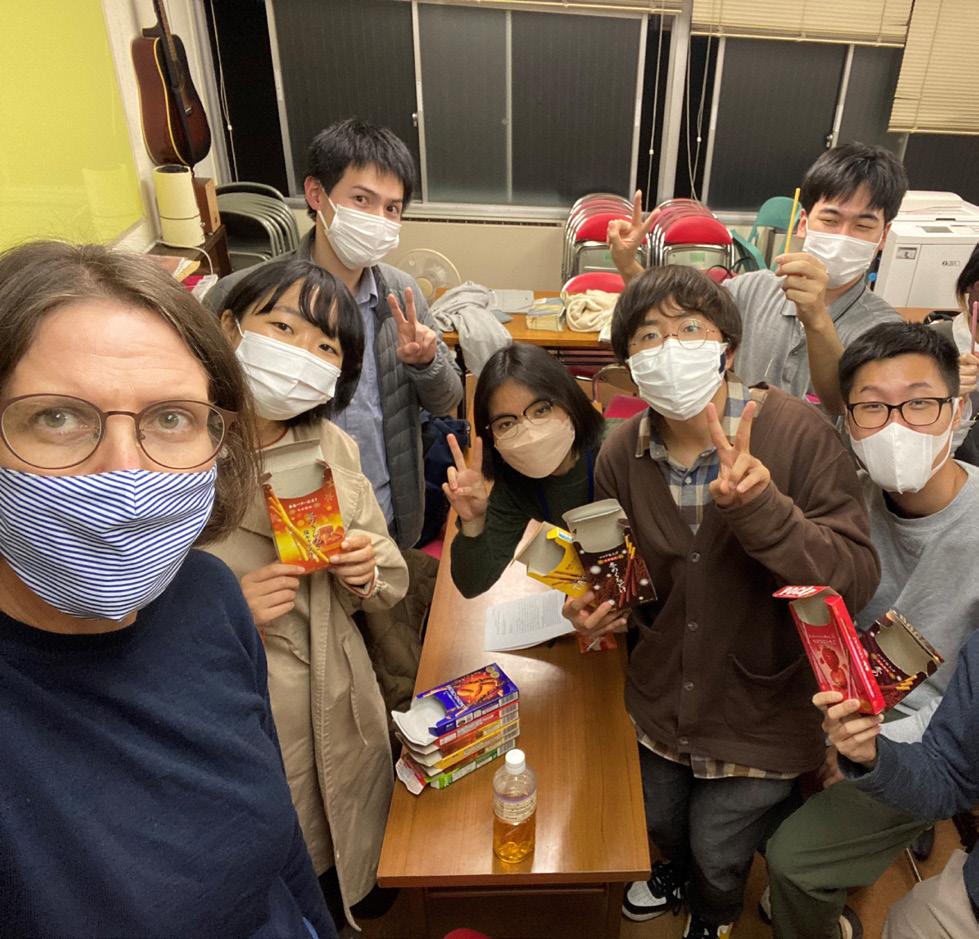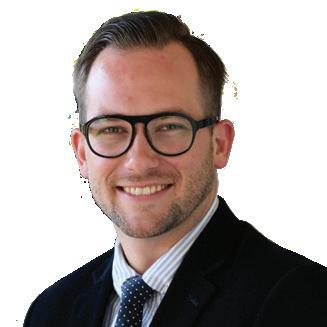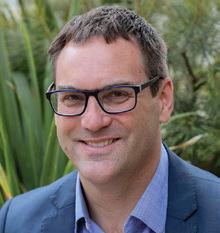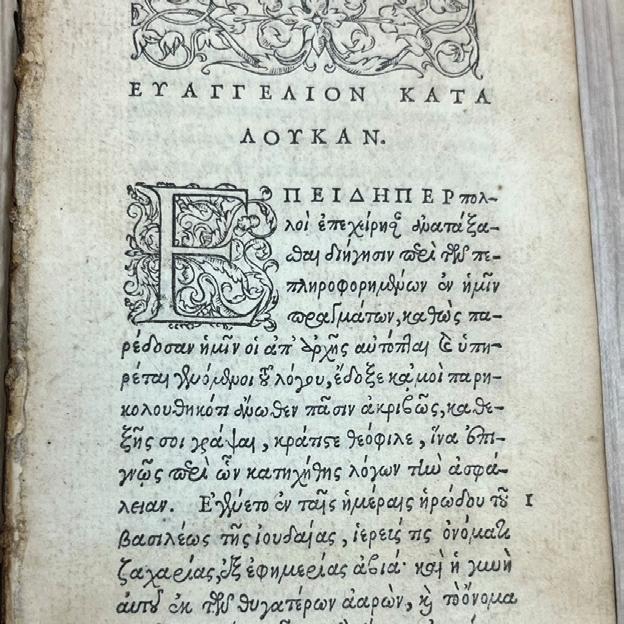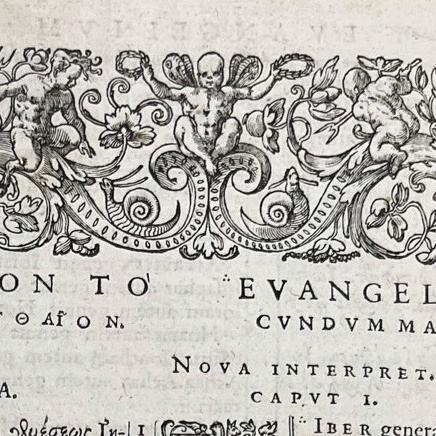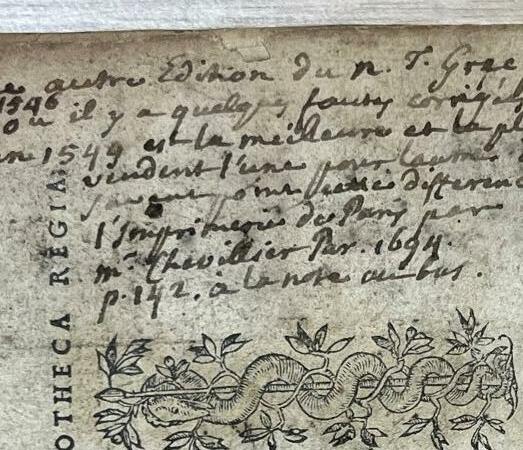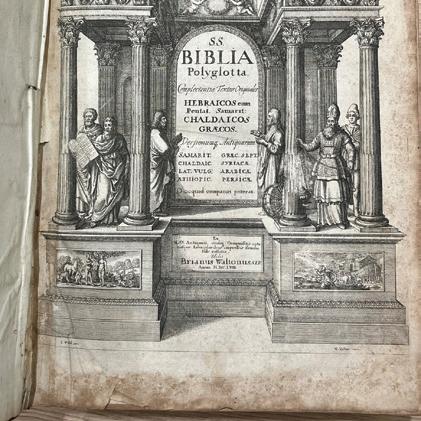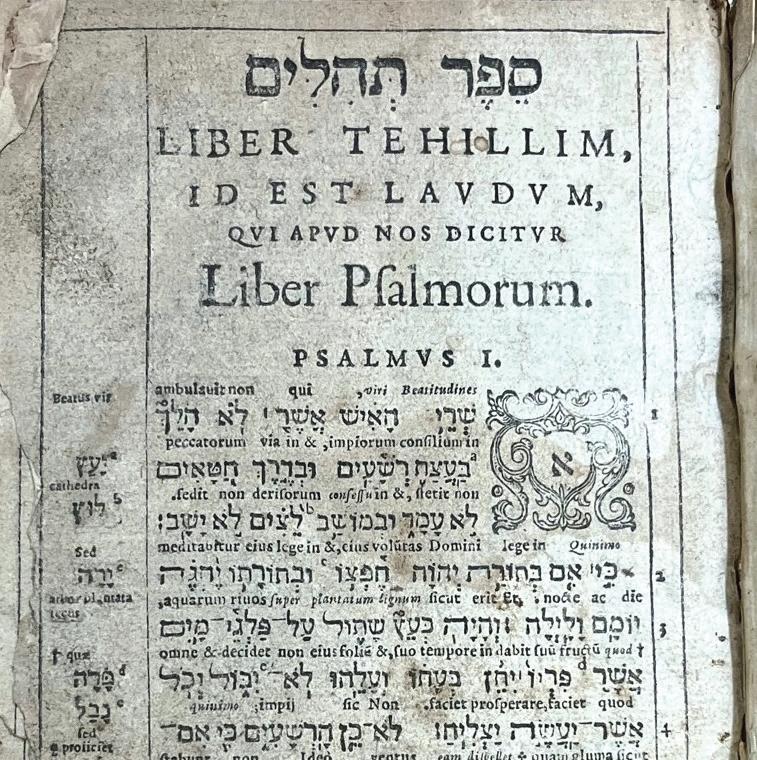The joys and opportunities in global mission pages 6-7

Mission in Japan pages 8-9

The joys and opportunities in global mission pages 6-7

Mission in Japan pages 8-9
C.C. Godden: Moore College’s martyr pages 12-13
Theological education for overseas mission: is it necessary? 2-3 Mission in Africa 4-5

The joys and opportunities in global mission 6-7
The joys and opportunities of overseas mission in Japan � � � � �8-9 An interview with CMS missionary in training, Matt Tyler 10-11
“Let there be peace”: the spiritual legacy of C�C� Godden 12-13 International Student Fund Appeal 14-15
MOORE COLLEGE HAS ALWAYS HAD A GLOBAL FEEL. THE FIRST PRINCIPAL TRAVELLED OUT FROM ENGLAND IN 1856. WE HAVE TAUGHT SUBJECTS IN CROSSCULTURAL MISSION SINCE AT LEAST THE 1970S. OUR DEPARTMENT OF MISSION COMMENCED IN 1997 AND OUR CENTRE FOR GLOBAL MISSION WAS LAUNCHED IN 2016.
Many of the current faculty have done advanced research overseas. We remain at heart the theological college for the Anglican Diocese of Sydney, but for many decades we have also been much more and our vision embraces the entire world.
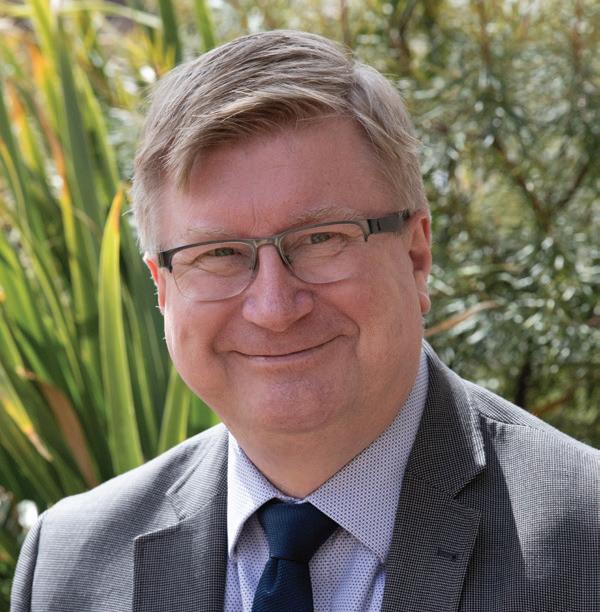
Much of our involvement in overseas missions has been in response to requests for help from church leaders and other Christian workers in places without the wonderful gospel resources we have here in Sydney. For many years our correspondence course, the PTC, has been used to help provide training for evangelists and church workers in majority world settings. We continue to resource young theological colleges in Africa, Asia and South America in their efforts to equip labourers for their part of the Lord’s harvest field. There are many more requests than we are able to meet, but our Centre for Global Mission has provided innovative ways of extending our reach in various parts of the world.
Why is theological education so important for those engaged in overseas mission? Let me suggest three reasons. Unsurprisingly, they are similar to the reasons why
theological education is so important for long-term ministry of the word and prayer in any context.
1. The gospel message needs to be clearly communicated to people who, whatever their location, culture or ethnicity, are lost without Jesus. We know that the proclamation of the gospel is the powerful means by which God saves men and women from sin and all its consequences (Rom 1:16–17). Like the apostles, we have been entrusted with the gospel (1 Thess 2:4) and work alongside others in the gospel (1 Thess 3:2). The gospel is the gospel concerning God’s Son, promised beforehand through the prophets in the holy Scriptures, the glorious one who came to save his people from their sins (Matt 1:21). The gospel message of sins forgiven, freedom from condemnation and new life for all who are in Christ, comes to us in the context of the whole of the Bible—from the promise amid the curse in the beginning, against the backdrop of God’s creative activity that brings all things into existence, to the promise at the end of Jesus’ return to bring in a new heaven and new earth. It is a gospel full of consequence for every area of life lived now in between Jesus’ first coming and his return. It is an announcement of extraordinary grace which carries with it a summons to faith and repentance (Mark 1:15). The wonder of what God has done in Jesus can never be exhausted and it is of monumental significance for every human being.
All of this means that getting the gospel right— understanding what God has made known about himself, his great eternal plan to save men and women and have a people for himself in Christ’s kingdom, what this means for us now and what it means to live as disciples of Jesus awaiting his return—is crucially important. Clearly communicating that gospel across cultures requires a deep understanding of the gospel, of what lies at its core, and of why that message is
unalterable and indispensable, relevant to both Jew and Gentile, in fact to every human being on the planet. The gospel needs to shape our understanding of God, the decisions we make, the relationships we inhabit, the words we use, and the way we behave. A theological education that involves a deep immersion in the word of God and serious reflection on the nature of the gospel, letting it shape our convictions and character as well as our message, is a vital element in preparation for word ministry, whatever its context. Why theological education for overseas mission? The first reason lies in the importance of the gospel itself and the need for every person on earth to hear the gospel and see it lived out by its messengers (Matt 24:14).
2. To communicate the gospel effectively is more than just a matter of understanding the gospel, it requires an understanding of the people we are trying to reach and their context from the perspective of the gospel. Underlying the bewildering variety of cultures and contexts in which we might exercise a ministry of the word and prayer are common truths about the nature of human life and the impact of human sin. The gospel gives us a perspective on those in front of us as precious in God’s sight and yet lost and facing judgment. It reminds us that distortions at the level of our thinking and of our behaviour are consequences of sin. We can delight in the cultural diversity we experience in the world while not falling into the trap of thinking every element of it is benign. We must be able to weigh cultural commitments and cultural expressions— especially our own!—in the light of the gospel.
Ministry is always ministry to people, and people always inhabit a context. The gospel message is heard within that context. We are not at liberty at all to change the message. It must be the gospel of God that we are sharing. With the apostle Paul we must be emphatic that there is only one gospel (Gal 1:6–9). But we are also not at liberty to ignore the particular challenges and roadblocks to hearing that message and understanding it in the context in which we serve. That is a tricky business. Too often in history we have ended up with either a gospel compromise (some blend of the
culture and the gospel which ends up distorting the gospel) or a gospel that is inaccessible (because little attention has been given to who it is we are seeking to reach and how they understand the words we say). Why theological education for overseas mission? Because understanding those we want to reach with the gospel is first and foremost a theological activity.
3. The gospel mission is always under challenge and the most urgent presenting challenges shift from one generation to the next.
A ministry of the word of God and prayer is hard work. It is not for the fainthearted. The Bible often uses an analogy with shepherding to describe the work of ministry (1 Pet 5:1–2). Shepherds nourish the sheep by feeding them. They also protect the sheep by guarding them against those who would harm them and helping them to avoid obstacles along the path. But to recognise a challenge (whether a wolf or an obstacle) requires knowledge, discernment and—if you are going to stand up to the challenge—courage. It also requires humility and compassion rather than a high-handed sense of superiority or pugnaciousness. Self-awareness is important if you are really going to be focussed on the needs of the people you are serving and not simply defending your own sense of being right.
The challenges may be different both across time and across cultures. Simply preparing to address today’s challenges or the challenges of your current context is not enough (but still important). We need to learn how to distinguish between what is central and what is peripheral, what is an article of faith and what is a matter of adiaphora (indifference or unimportance). Careful thought about the connection between biblical ideas, the consequences of biblical ideas, and the proportions of biblical ideas is needed. Then we can look at this new idea, or strategy, or cultural shift and weigh it properly against the word of God. Why theological education for overseas mission? Because we need to be prepared to engage and answer the challenges of tomorrow and not just today.
There are a myriad of other reasons why getting the best theological education available is important for overseas mission, but here are my top three: the gospel itself, the people we are trying to reach with the gospel, and facing every new challenge to the gospel. I hope you find this issue of Moore Matters helpful in thinking further about global mission, which remains one of the great passions of our College.
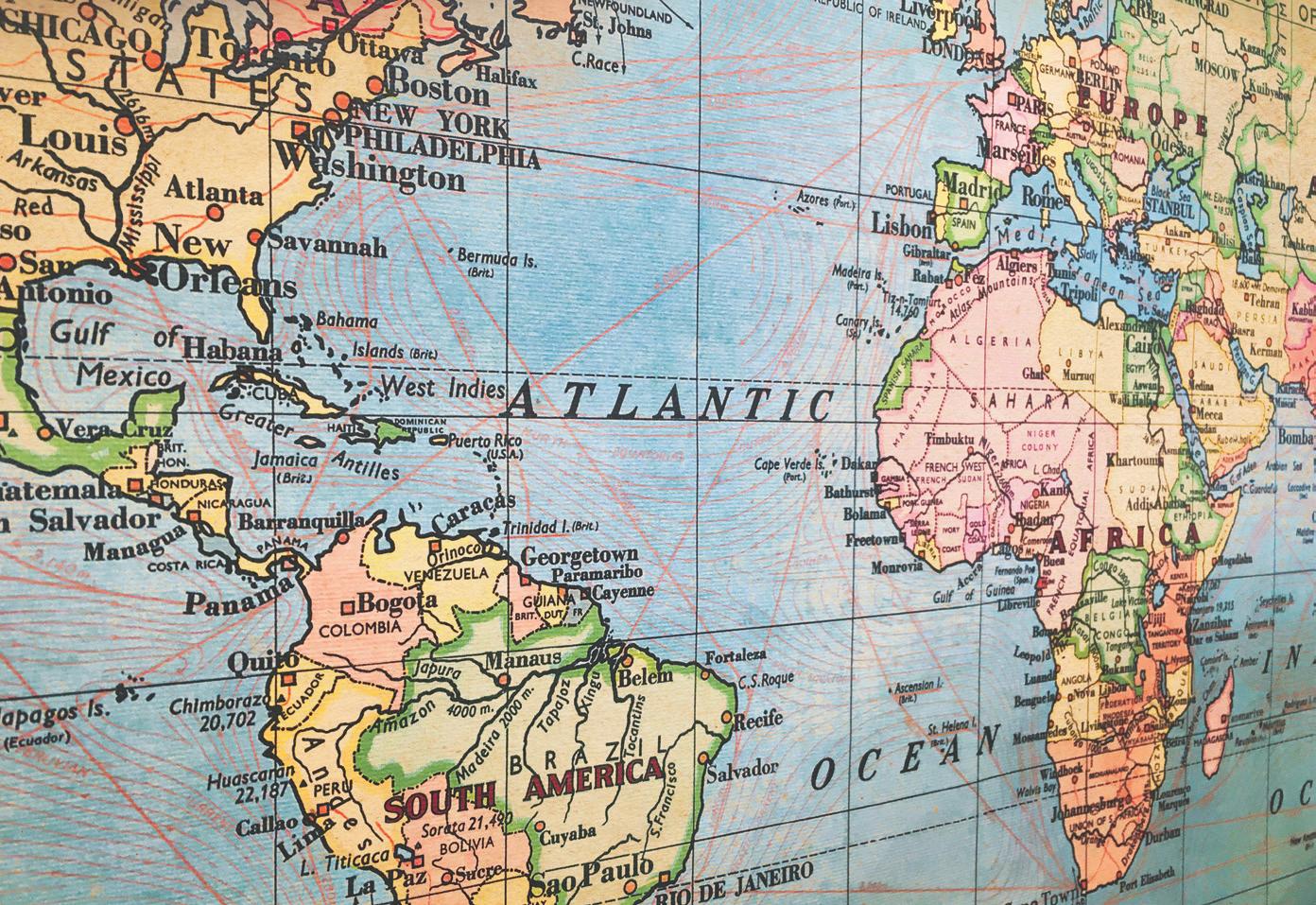 Dr Mark D Thompson, Principal
Dr Mark D Thompson, Principal
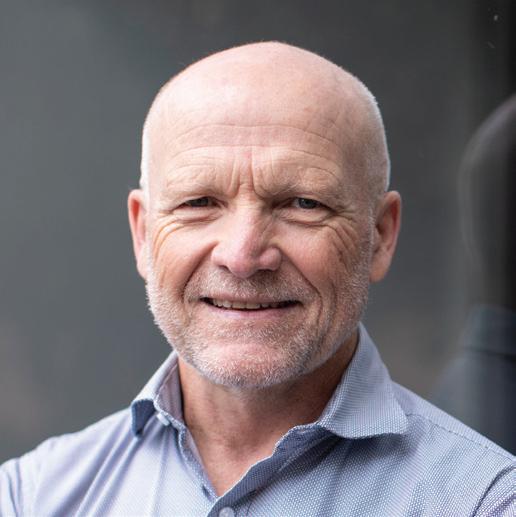
CHRISTIAN MISSION IN THE CONTINENT OF AFRICA IS A HUGE TOPIC! THAT’S BECAUSE AFRICA IS MASSIVE, COMPLEX AND DIVERSE IN TERMS OF SIZE, POPULATION, ETHNIC DIVERSITY, LANGUAGE AND RELIGION.
To engage with gospel ministry in Africa, we should start with some statistics. Get ready, as the stats are mind-boggling!
The African continent is roughly four times the size of Australia, covering about 20% of the world’s land area. Africa has a population of approximately 1.4 billion people who live in 54 countries. The Joshua Project (https://joshuaproject.net/continents) tells us that there are around 3700 distinct people groups and that they speak between 1250 and 2100 languages (depending on the definition of language versus dialect).
Christianity in Africa has seen rapid growth. At the beginning of the twentieth century, most parts of Africa had little or no contact with the gospel, with perhaps nine million Africans professing the Christian faith. Now there are reported to be more Christians in Africa than on any other continent, with 631 million Christians (figures from 2018). However, before we get carried away by this figure, the number of evangelical Christians is much lower, and 29.6% of the African population remains ‘unreached’. These are mainly in the Muslimmajority countries in the north and north-east.
What are the challenges for the church in Africa, and where does Moore College fit in?
The massive growth of the church in Africa has contributed to one of its greatest challenges: the training of leaders. Many pastors across Africa have little or no theological education. The speed of church growth is accompanied by other issues that make training leaders difficult, such as the cost and accessibility of theological education. The proliferation of independent churches is a related issue, as pastors with no connection to a denomination are less likely to be able to access training. One estimate is that Africa requires 1 million new pastors just to deal with current demand. And this does not take into account the expected growth in the number of Christians or that many existing pastors are reaching retirement age.
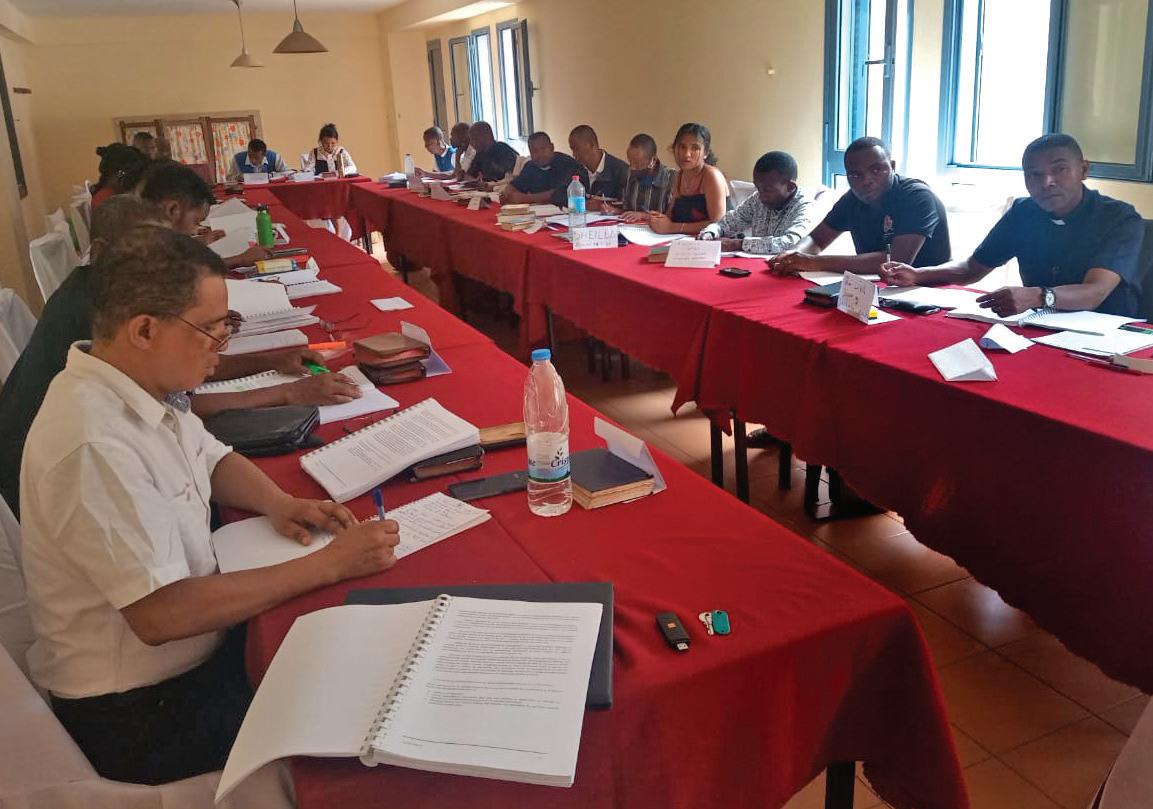
Moore College is well-positioned to contribute to the challenge of educating leaders for Africa. For many years, we have had a small trickle of students from Africa who have studied at Moore before returning home to teach and preach. This continues with the added opportunity for a small number who access the Moore College online diploma (Diploma of Biblical Theology). Our graduates have also gone in significant numbers over the years, with CMS and other agencies, to teach in Bible schools or theological colleges. Even today, CMS receives many requests from partner churches across Africa and could place as many people as offered to fill such positions. The need in Africa is bigger than ever, but only a few of our graduates are currently offering to go.
However, while sending Moore graduates to work in Africa remains important, a quick check of the maths will tell us that these strategies alone cannot be the only answer to the massive numbers needed. Ideally, the church needs many African Bible teachers trained locally in Africa at minimal expense who can either lead churches themselves or become the next generation of trainers.
The Centre for Global Mission (CGM) at Moore College can impact this need for more training. The role of CGM is to provide high-quality evangelical theological training resources to less-resourced churches worldwide. The primary resource that CGM offers is the content of the Moore PTC, but we are also starting to develop another ministry training course called ‘Bible Basics’, aimed at the ‘oral preference communities’ which make up 70-80% of the world’s population. PTC is a useful course, but we must make it
accessible to African students.
The first step to accessibility is translation. CGM is translating PTC into languages useful in the African context. We already have most subjects in French (and, of course, English), and now we are making significant progress in Portuguese and Swahili (200 million speakers!). Arabic would be a useful addition for use in the north of Africa. Pray that we will find the resources for an Arabic project.
Delivery is the next issue. CGM has no students of its own, but we give our partners in Africa access to resources so they can teach in various offline or online modes. Costs are kept to a minimum, meaning there is no charge for a partner to have offline access to resources, and a small charge if a partner wishes us to provide an online learning platform, which our team has developed for the purpose. The current package means that we have a low-cost curriculum and accessibility in terms of language and technology.
The Anglican Church in Madagascar is an excellent example of a successful partnership with Moore College and other parts of our Sydney network. Madagascar is a large island (roughly the size of France) off the east coast of Africa, and is one of the poorest countries in Africa.
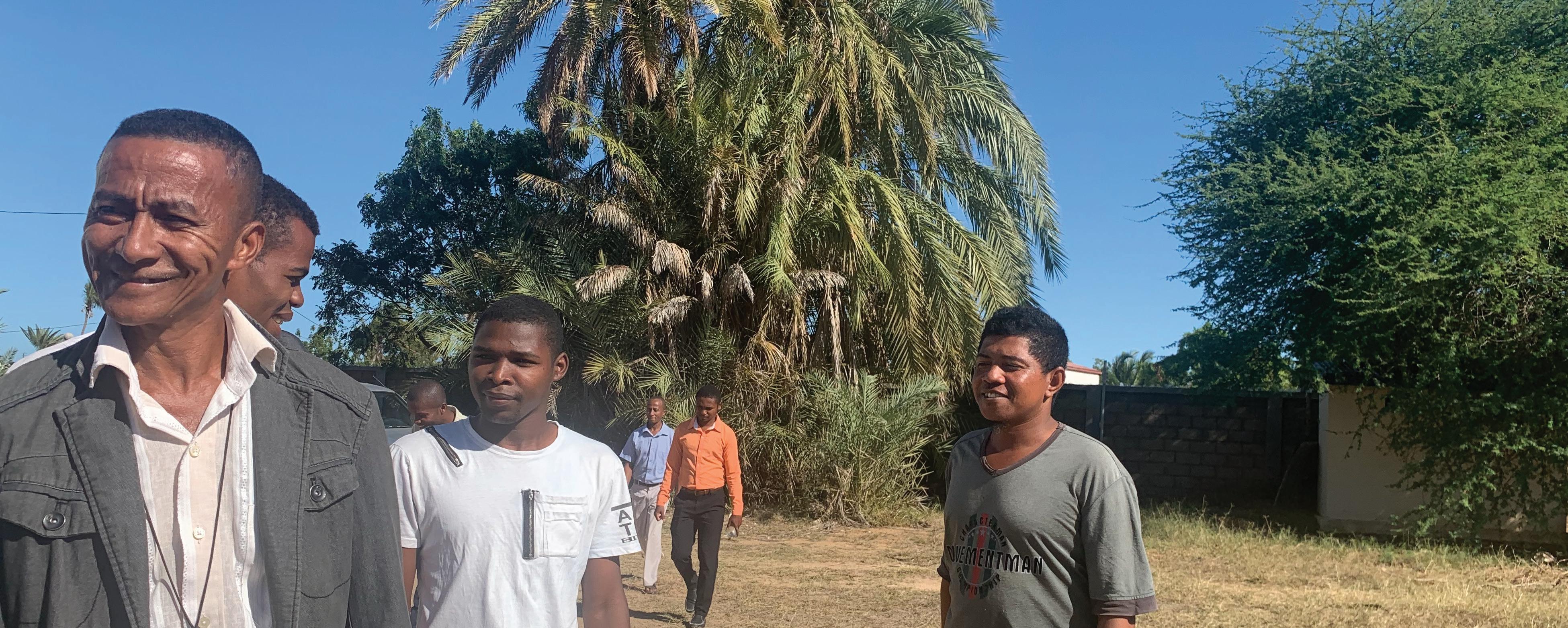
The Anglican Church in Madagascar is underresourced, with a massive need for more trained pastors. One of the more established dioceses has around 300 churches and only 16 trained clergy. The Diocese of Toliara, in the south, is situated in an impoverished part of the country and is relatively new. Part of this diocese has seen thousands turning from animism to faith in Christ. Fifty new churches have been planted in the last two years with no trained leaders.
A few people have been travelling to Madagascar for years to teach French PTC. However, PTC training now takes place in Malagasy, the local language of Madagascar. This CGM translation project and the training across the country are under the direction of Reverend Berthier Lainirina. Berthier has also
become the Principal of the Anglican Bible College, which trains people for most of the Anglican Church. The curriculum of the Bible College is also based on PTC. He plans to extend the reach of the college by starting to offer PTC online around the country. CGM is preparing this online facility now. At the same time, Sydney Diocese, through Anglican Aid and the Work Outside the Diocese Committee, is paying for scholarships at the Bible College, and CMS is searching for missionaries who will agree to go.
The need for well-trained church leaders in Africa is enormous—please pray! Pray, too, that God would use Moore College as a small part in providing a solution. The team at CGM needs prayer and finances as we establish partnerships, translate PTC, improve our technology and write resources. Pray for our partners across Africa who use CGM resources, and also pray for Moore graduates (African and Australian) as they faithfully teach the Bible. Pray that many more would offer themselves to CMS and other agencies for Bible teaching ministries in Africa. Ask the Lord if you should be one of them!
For more information about CGM, visit cgm.moore.edu.au, or scan the QR code below:
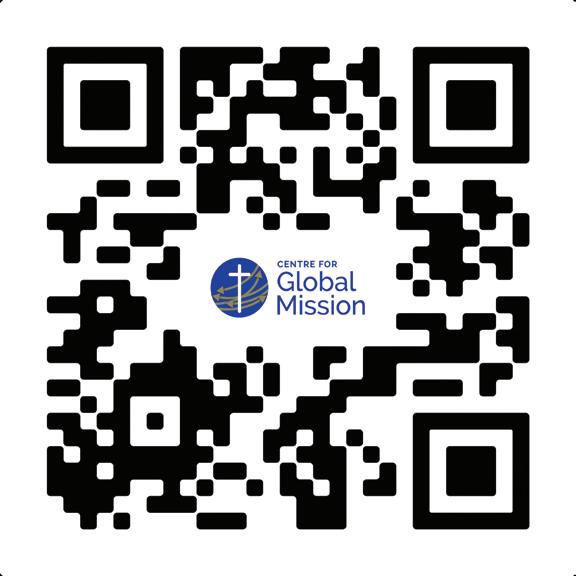
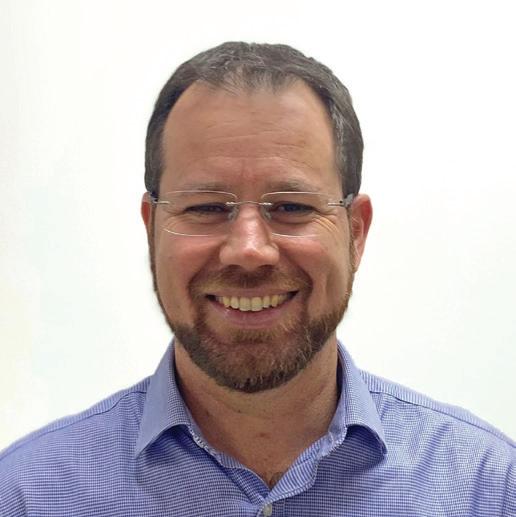
THE JOY OF KNOWING CHRIST AND THE ETERNAL SECURITY WE HAVE IN HIS DEATH AND RESURRECTION IS A LIFETRANSFORMING REALITY.
And it is this joy that lies at the heart of the vision of the Church Missionary Society (CMS) to see a world that knows Jesus. It has recently been reported that the world’s population has reached 8 billion people. Can you wrap your head around the staggering number of people who need to hear the gospel? Never has the harvest been so plentiful; never have opportunities to share the joy of salvation been so abundant.
In Matthew 13:44, Jesus tells a short parable to explain the extraordinary value of the glorious gospel of Christ.
The kingdom of heaven is like treasure hidden in a field. When a man found it, he hid it again, and then in his joy went and sold all he had and bought that field. We could draw attention to the great price this man paid—giving up all he had for the sake of the kingdom. We could note his single-minded devotion and commitment to securing this one treasure. But I want us to notice a key phrase in this verse that is worth reflecting on. Upon discovering the great treasure of the kingdom, it is in his joy that the man went and sold all he had. The treasure of the gospel and the good news of our place in the kingdom of heaven brings great joy. This treasure surpasses the value of material possessions and anything else this world has to offer! And for this reason, there is great joy in serving in global mission, living out these transformed priorities. There is nothing greater, nothing more precious for all people in all places, than knowing Jesus. In contrast to having the great treasure of knowing Christ and belonging to the kingdom of heaven, many people worldwide are gospel-poor. CMS is committed to reaching gospel-poor peoples for Christ. This means where witness to Christ is limited, we proclaim the gospel, disciple believers, serve in various roles, and partner with the local church.
One of the great joys experienced since the earliest days of mission is seeing people come to faith in the Lord Jesus. In Acts 15, we read how Paul and Barnabas, travelling through Phoenicia and Samaria on their way to Jerusalem, share news of how the Gentiles had been converted. What is the impact of this news? It brings great joy to all the believers! (Acts 15:3-4) This continues to be true today, as cross-cultural workers see people respond to the gospel in faith and repentance. CMS missionaries regularly share stories through prayer updates of how God is at work, bringing us great joy. Here are some recent examples from across the world: Dave and Beck serving in Japan:
Give thanks for the 3 young people from church who we will spend eternity with!
Simon and Jess serving in Italy:
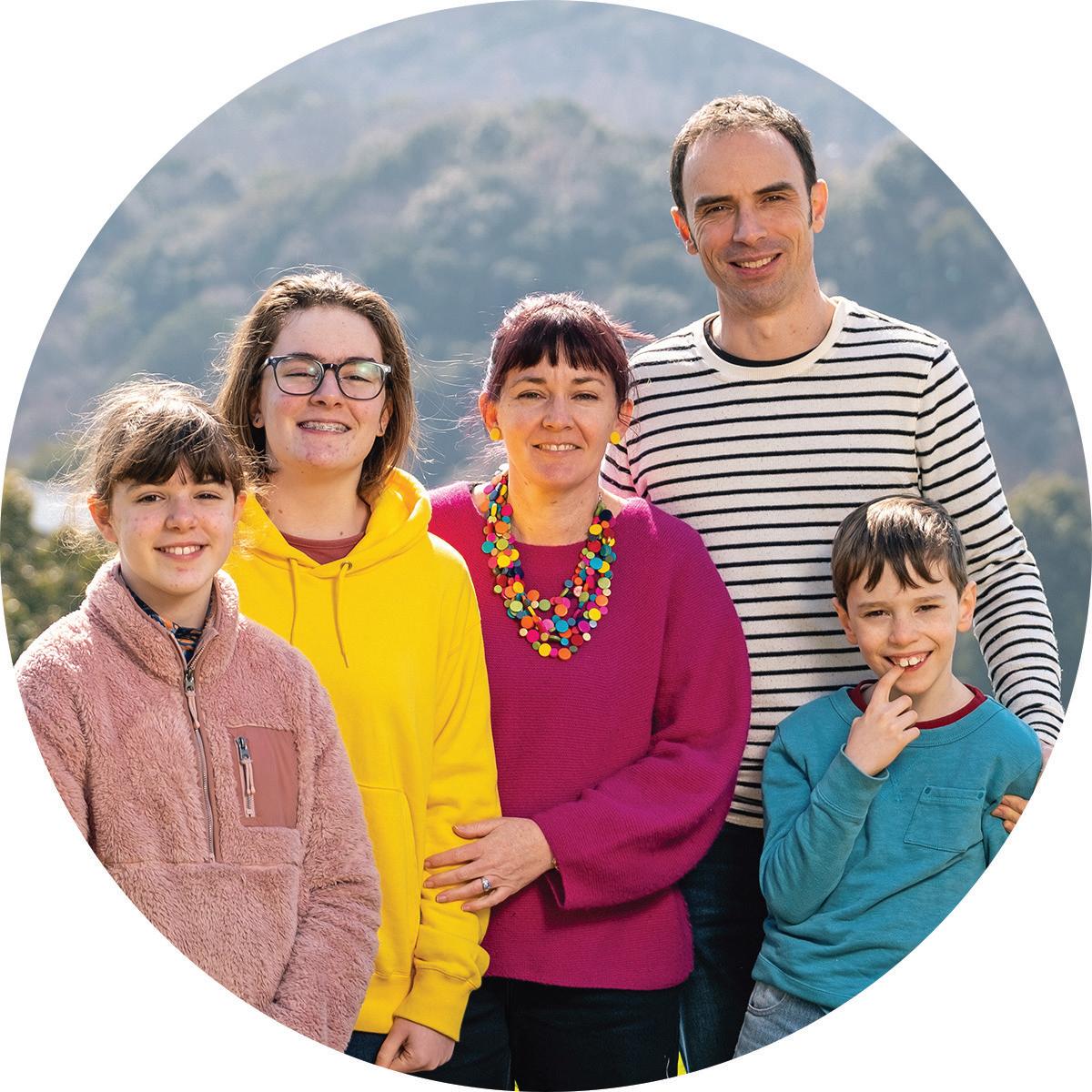
Give thanks for having some new kids coming to kids’ church—one of our neighbours, and one of Lydia’s friends from school.
Dan and Marg serving in the Middle East:
Give thanks for God’s grace and love towards us and that we can be witnesses as we share this with others.
and family
As well as seeking to reach gospel-poor peoples for Christ, CMS is committed to equipping Christians as leaders in the church and the world. Through this ministry, cross-cultural workers experience the joy of seeing others grow as disciples of Jesus.

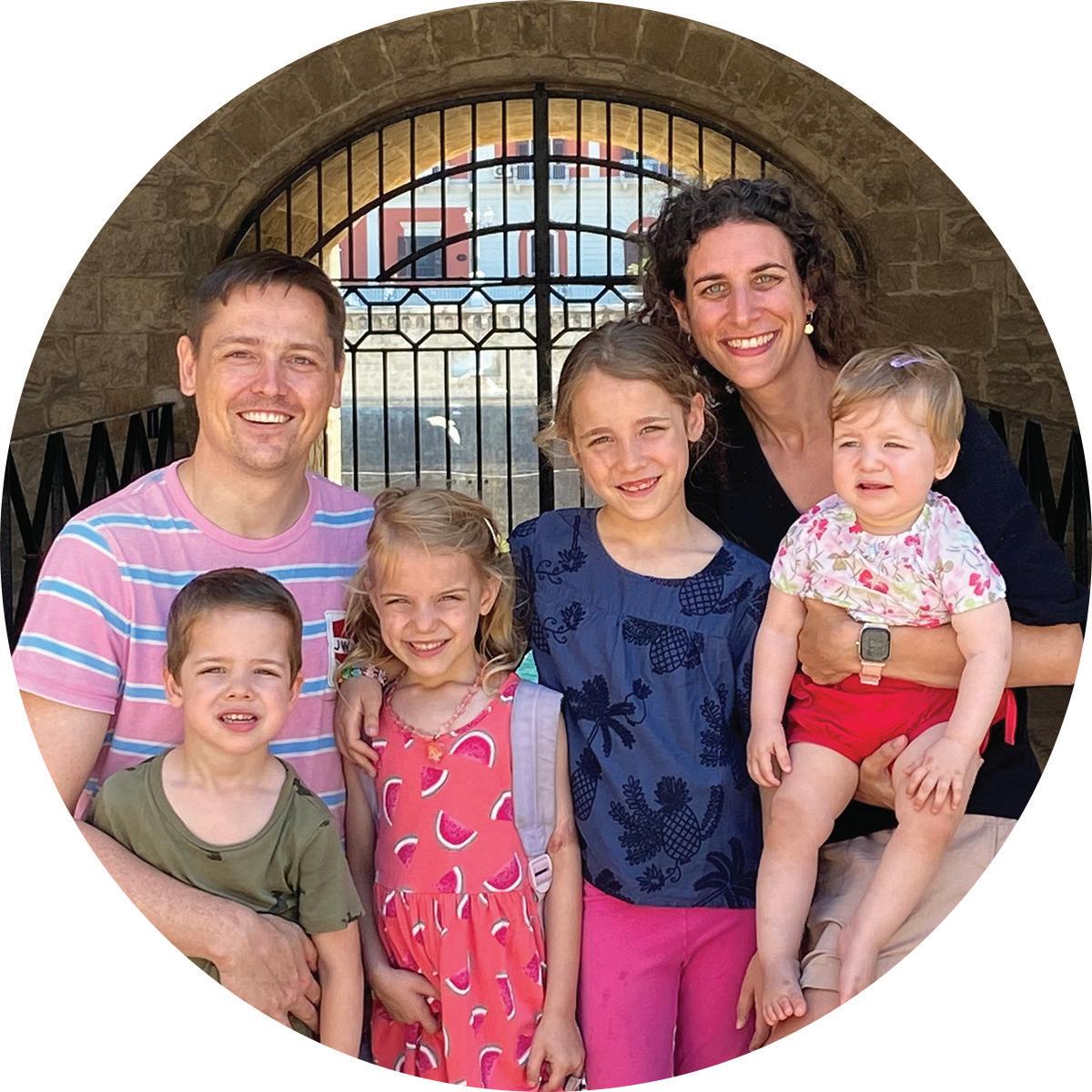
The Apostle Paul describes the joy he experiences from God’s work in the life of the believers in Thessalonica. He even describes them as his joy—both in the present and anticipating his future joy of being together in Jesus’ presence when he returns.
For what is our hope, our joy, or the crown in which we will glory in the presence of our Lord Jesus when he comes? Is it not you? Indeed, you are our glory and joy.
1 Thessalonians 2:19-20
What a blessing to be used by God to train and equip fellow disciples as we look forward to an eternity with them in glory! CMS missionaries regularly share this joy in their prayer updates.
Morgan and Olivia serving in the Middle East:
It’s been a joy seeing a bunch of students and graduates step into new ministries at our church. It was wonderful to be led in prayer and corporate worship by a brother who is growing in the knowledge and service of the Lord.
Rebekah serving in South East Asia:
Rejoice that local Christians want to reach out to their communities for Christ.
Peter and Terry serving in Argentina:

Praise God for all those who managed to get to the ABUA conference and for the happy and encouraging spirit during the conference.
Seeing people come to know Christ, and seeing disciples trained and equipped for ministry, is a tremendous privilege and joy of serving in global mission. And there are many opportunities to serve across the world.
There is a tremendous breadth of opportunities for serving in global mission, with diverse roles and locations. These opportunities include discipleship, evangelism, youth ministry, teaching, international church ministry, theological education, trade skills, medical work, student ministry, and many more. Check out the web page below to explore these opportunities in more detail: www.cms.org.au/get-involved/opportunities
I recall someone sharing with me how for years, they listened to the stories of missionaries on deputation and at CMS Summer School and thought, “I could never do that!”. They went on to serve long-term with CMS in cross-cultural mission, and God brought much fruit from their ministry. Have you prayerfully considered how God might work through you?
The opportunities are many, and the joys are countless. How might you serve in mission as together we work to see a world that knows Jesus?
For more information about CMS, visit www.cms.org.au/nswact/, or scan the QR code below:


*For security reasons, we are unable to show the faces of all missionaries.

YOU HAVE PROBABLY HEARD THE STATISTICS ABOUT CHRISTIANITY IN JAPAN—THAT LESS THAN 1% OF THE POPULATION ARE CHRISTIANS, THAT CHURCHES ARE SLOWGROWING AND AGEING, AND THAT MANY PLACES DON’T EVEN HAVE A CHURCH.1
You may also have heard that Japan has been dubbed the ‘missionary graveyard’ for many reasons, including that missionaries, on average, take more than two years to learn Japanese, around eight years to adjust, and about seven years to get to a level of ministry competency.2 One of the things that people don’t often realise about Japan is that Protestant missionaries first came here over 150 years ago to share the gospel. And there is a faithful but small church that has been working hard ever since to spread this good news with their neighbours. They have often faced much prejudice and persecution throughout that time, but they continue to serve God and his people while seeking to reach out to the lost.
These statistics are true from my experience in terms of adjustment as a missionary. It was only as I headed towards the 10-year mark that I started to feel like I knew what I should be doing and how to do it, as well as having a good network of relationships. I am thankful to God for using me in my
1 Check out ‘Beneath the surface: 30 ways to pray for Japan’ by OMF to find out more specific needs.
2 Janet Dallman, ‘Staying Well: Highlighting hazards, highlighting health for Missionaries in Japan’, 2021.
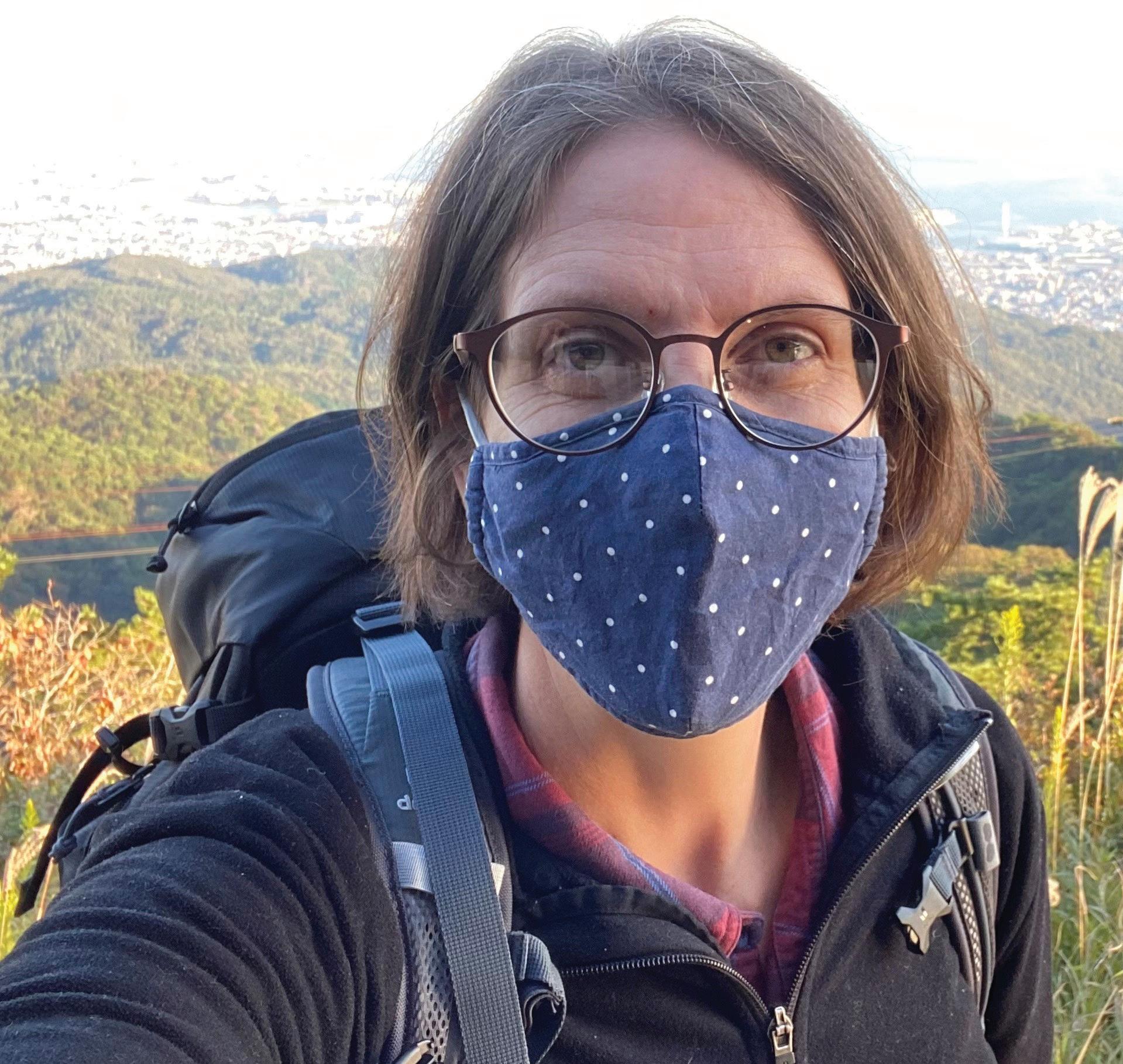
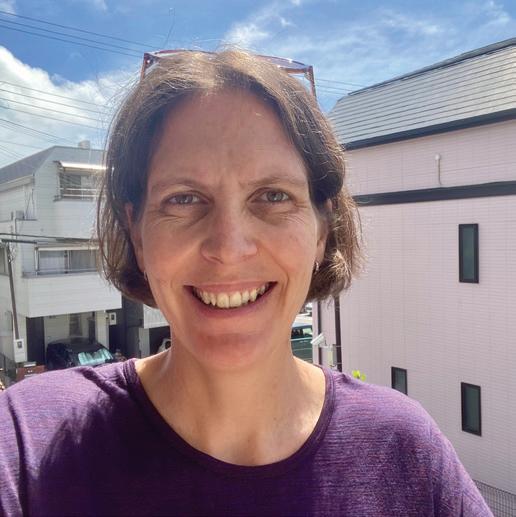
weakness both then and now. But for missionaries in Japan, it is not only language and culture learning, but the ‘strangeness’ of the gospel message to Japanese ears that is challenging. Concepts like grace, reconciliation, and there being only one God don’t fit with a Japanese worldview. These concepts are seen as foreign, and people often say, ‘but I’m Japanese; I can’t be a Christian’. So this may all seem very bleak and dire but what you don’t see in these statistics and challenges are the stories of how God has been working, in seemingly small ways, to see his word continue to go out. As I draw close to my
15-year anniversary, I am excited about what God is doing and the wonderful ministry opportunities. Like any ministry, serving in Japan is about people—getting to know them, walking alongside them and helping them to know the one who made them—which is why language and culture learning is so important. One of the lessons I learned early on in Japan was that just turning up can be an encouragement. In those early days, I would visit small groups on campus or attend prayer meetings and have little to no idea what was happening. If the group had two members and I showed up, that was a 50% increase, and
for many Christian students, just knowing that they are not alone was significant.
Over the years, I have also learnt a lot about the importance of belonging to a group and how that affects the spread of the gospel. It is often through relationships with friends or family that people first hear the good news. Many people who become Christians in Japan have been connected in some way or other to the church for 5 to 10 years. They often belong long before they believe. And so, it is important to be patient, trust in God’s timing, and keep talking about Jesus with anyone who will listen and rejoice
when His word works in people’s lives.
A big part of KGK ministry is raising up leaders for our campus small groups. Because the student population turns over every four years, this seems like a never-ending process. And yet, these students will become leaders in their churches, and some will even go into full-time ministry. The opportunity of getting alongside students, pointing them to God’s word and entrusting them with it (2 Tim 2:2) is truly a privilege. It can feel like such a small thing, but after ten years as a staff worker, when I meet up with graduates, I am always encouraged by how God has been using them despite the challenges they have faced and how what they learnt during their student years has borne fruit for his kingdom.
At the beginning of 2023, I look forward to welcoming Elle Bryce (a recent Moore graduate) to Japan. I hope to help her navigate the challenges of moving to a new country and learning the language and culture. I would love for you to pray for both of us, in our different stages of serving in Japan, that God will work in and through us for his
glory, that many Japanese people may come to know Jesus, and that his church will continue to serve Him faithfully. And if you think that you are up to the challenge of serving alongside God’s people here in Japan, I’d love to hear from you. Please visit the following address, or scan the link, to find out more about my work in Japan: https://www.cms.org.au/ missionaries/kellie-nicholas/

Kellie Nicholas came to Japan as a CMS missionary in 2008. She works with the KGK (Kirisutosha Gakusei Kai), a Christian student movement affiliated with IFES (International Fellowship of Evangelical Students). She studied a BTh at Moore from 2004‑6.

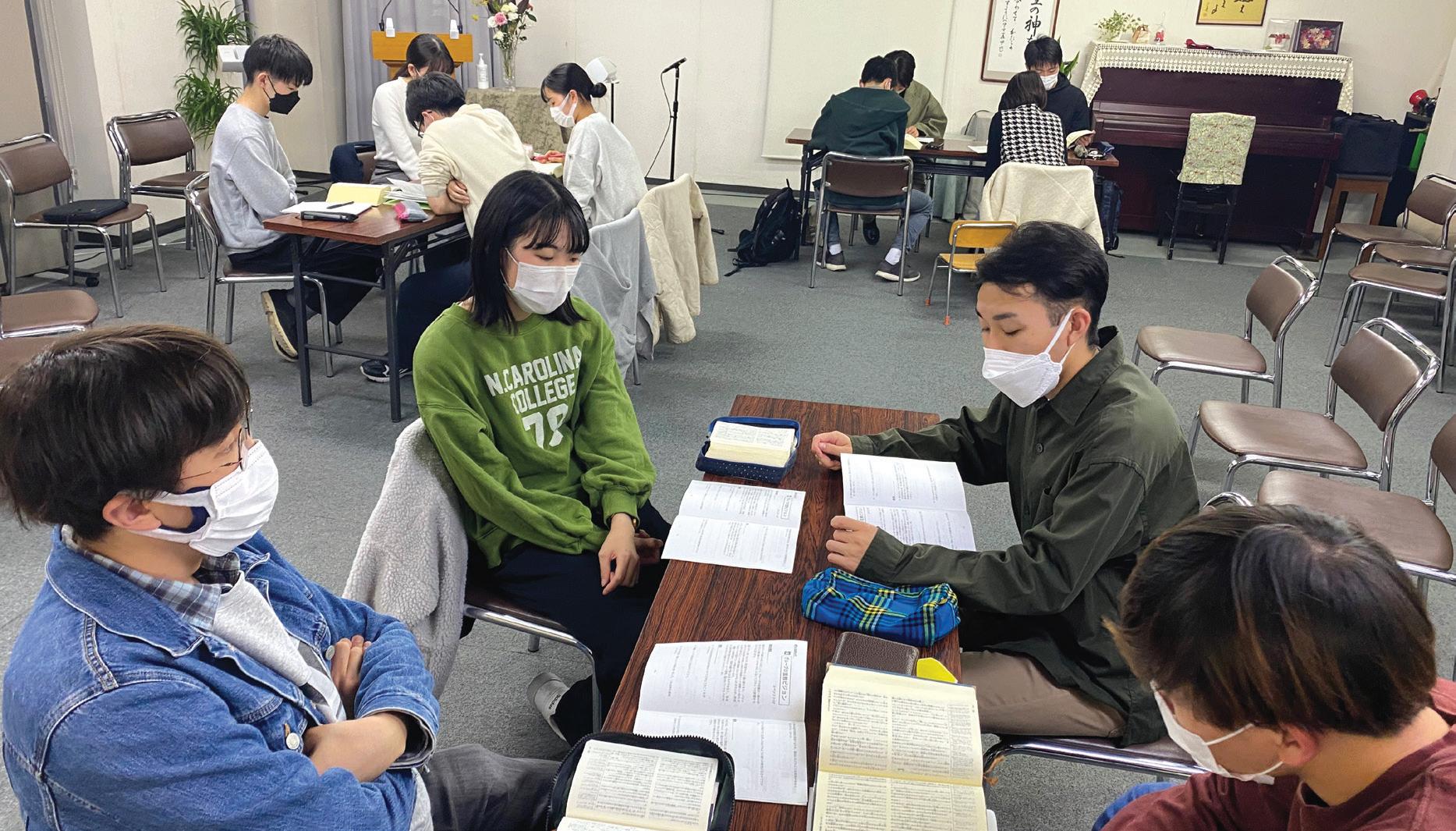
MATT AND ELLEN TYLER ARE PREPARING TO SERVE IN VANUATU WITH CMS. MATT FINISHED COLLEGE IN 2018 AND SINCE THEN HAS BEEN WORKING AS A LAY MINISTER IN SOUTHWEST SYDNEY.
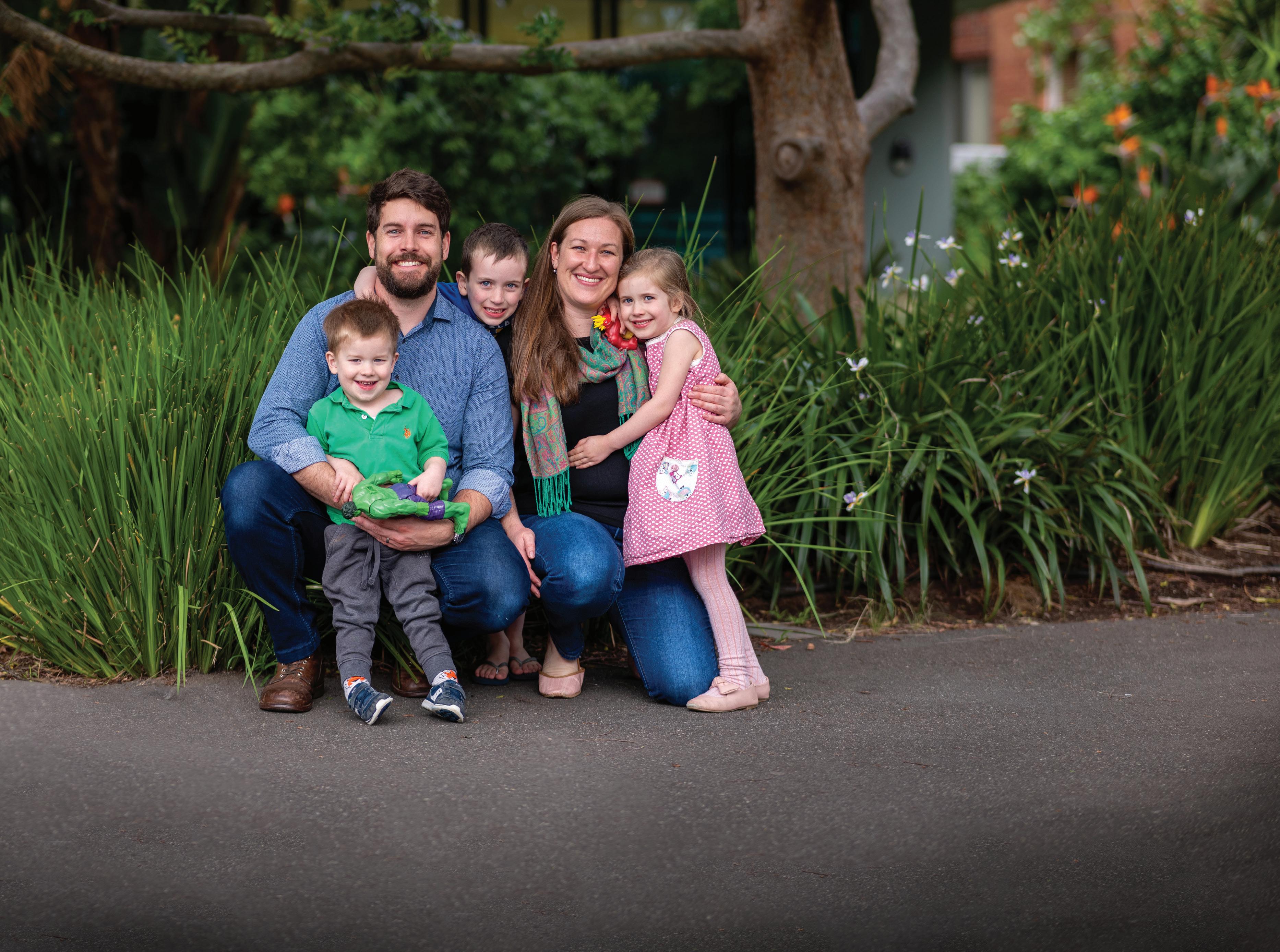
Moore Matters: You and your wife, Ellen, are currently at St Andrew’s Hall, preparing to go to Vanuatu. Why are you going there?
Matt Tyler: We’re planning on going to Vanuatu to train people to understand the Bible, translate it into their heart language and apply it to their lives. So Bible translation will be my main focus, working with locals to workshop a passage, draft a translation, and check it. Ellen will focus on discipling the women she meets and homeschooling our three kids.
Why Vanuatu?
Vanuatu has had a long history of Christian mission. The first missionaries arrived there over 150 years ago. But today, while most people call themselves Christians, not many have that personal relationship with God.
The fear of witchcraft and evil spirits is still
prevalent in their underlying culture. And part of why that’s happened is the sheer language diversity in Vanuatu. There are over 100 different languages spoken in Vanuatu, which has a population of 300,000 people.
MM: So there’s been a Christian presence there for over 100 years. Doesn’t Vanuatu already have a Bible in its various languages?
MT: Only six of those 100-plus languages have a complete Bible. And there are probably 30 to 40 language groups asking for a translation. Most people still use their first language daily. Yes, there is a common language called Bislama, which lots of people would speak, but it’s not their first language. One lady I read of said: ‘when I’m angry, I use Bislama. But I’ll use my own language when I want to say something lovely’. So that’s why there’s that need for Bible translation that speaks to people in their heart language. And the lack of translations in their heart language impacts teaching in churches, which tends to be legalistic, or the prosperity gospel. People are easily persuaded by whatever new cult or false teaching comes their way.
MM: Part of your preparation has been your study at Moore College. How has Moore College prepared you for this upcoming role?
MT: Moore College has been excellent preparation for the job of Bible translation. And for cross-cultural mission work in general. The focus on original language exegesis will be my bread and butter. All those skills will be valuable and useful to pass on. But also thinking theologically, seeing how one big issue impacts and connects to others, particularly as we’re coming across cultural differences or where the Bible challenges culture.
MM: How is CMS training preparing you for your mission service?
MT: The training is about 20 weeks across two terms. In the first term, we spent a lot of time thinking about what mission is and how we should approach it in a way that honours God and the people He’s made. There have been significant shifts in mission work from white people crossing the oceans to take the gospel to the unconverted nations. In contrast, mission now is from everywhere to everywhere. So missionaries are going from Korea to Africa, and Africans are coming to Australia to evangelise our people.
We learned about the different characteristics of cultures. Different cultures can be characterised by different values and ways of thinking, such as honour, shame, fear, and power. We’ve looked at different worldviews. We’ve done Bible storytelling, which will be beneficial for discipling people in an oral culture!
The training has prepared us to go slowly, humbly, and carefully across cultures. We’re not coming with all the answers, but to work with people and empower them to live for Jesus. So the big questions for my systematic theology in 21st-century Australia will be very different from the big questions in Vanuatu. In Australia, we don’t have to think much about spiritual warfare or land rights, but they’re the big things in Vanuatu.
MM: What do you expect will be the joys of serving the Lord overseas?
MT: I expect there will be joy in seeing that God is strong when we’re weak. We’re aware that it’ll take a while to feel like we’re on our feet. And I’m looking forward to seeing people’s eyes light up as they understand the Bible and grasp just how much God has done for them. I’m really looking forward to people understanding grace!
MM: What do you expect will be the challenges?
MT: Learning language and feeling (not very) useful. CMS missionaries usually enter a country as tertiaryqualified professionals. But they immediately drop to the capacity of a two-year-old, who can barely say, what’s that? Or, I’m hungry. I want food. You become a baby again when you learn a language. I won’t be able to hop out of the airport and start preaching!
MM: How can readers pray for you as you head overseas?

MT: Please pray for our kids Tom (6), Beth (4) and Harry (2.5), that they will stay resilient through ongoing change and moving countries. Pray for us that we keep parenting patiently. Pray for more workers to go to Vanuatu. There are enormous needs for Bible translation and people in Bible colleges.
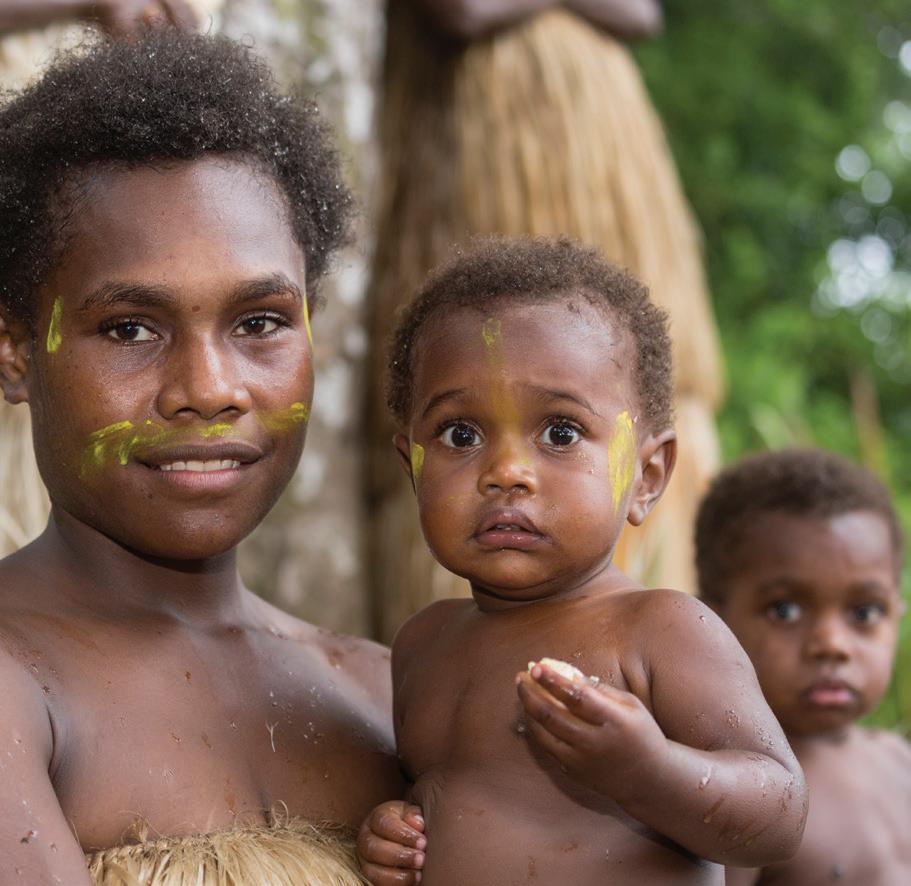
MM: So what encouragement would you give our readers to consider mission work themselves?
MT: Do it—please consider it!
A helpful question we found is to keep asking why not? Why not go?
Not, why should I go overseas? But instead asking why shouldn’t we? What’s holding us back? After asking this question, you might realise nothing is holding you back!
Another helpful metaphor we picked up in College is to keep leaning on the door of mission. You might not be able to go yet. But keep leaning on the door, keep going to CMS Summer School, keep praying for CMS missionaries. And keep asking that question, ‘Why not?’.
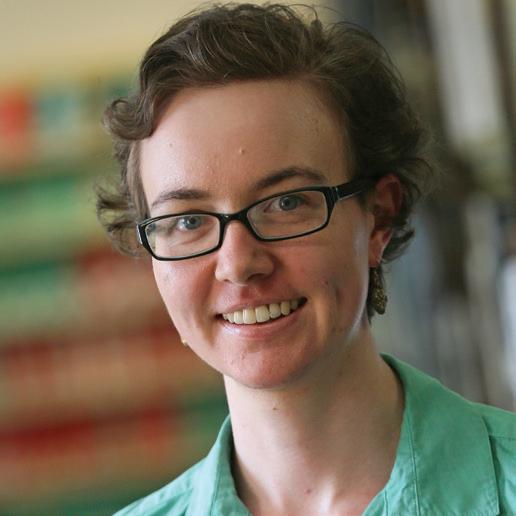
Although Charles Christopher Godden (1876-1906) was only 30 years old when he died, and had spent just 5 years on the mission field of Ambae, Vanuatu,1 his untimely and violent death in 1906 has been greatly used by God to spread the good news of peace among the local inhabitants. His story and legacy are remembered today, even after Ambae was rendered uninhabitable by a volcanic eruption in 2018.
Charles Godden was born and raised on a farm in country Victoria. The minister at Euroa, Rev William Hancock, invited Charles to confirmation classes. Embracing wholeheartedly the faith that was taught, Charles not only requested confirmation but asked Hancock shortly afterwards about becoming a clergyman. Despite having to work on the farm, Charles studied at night under the tutelage of Rev Charles Barnes, Vicar of Yea.
In only 2 years, he had mastered Greek and Latin. This prepared him for theological studies at Perry Hall, Bendigo, under Rev Nathaniel Jones. In 1895, Charles wrote to his sister Louisa “God has been very gracious to me thus far…My constant prayer is that I may further his cause.”2
When Jones was appointed Principal of Moore College, he was able to bring Charles with him and support him in his studies. After his ordination in 1899, Charles worked as a curate at St Michael’s Surry Hills, alongside the Rector Dr James Manning. His abilities and servant-
1 Before independence in 1980, Vanuatu was known as New Hebrides. The island of Ambae is referred to in older sources as Opa, Omba or Aoba.
2 Quoted in Ruth Godden, Lolowai: the story of Charles Godden and the Western Pacific, (Sydney: Wentworth Press, 1967), 22.
hearted attitude greatly impressed Dr Manning, who reported that Charles was so generous that he gave all his clothes away to poor parishioners!3
The same zeal for the gospel which had led Charlie from his confirmation class into the ministry was then used by the Spirit to spur him on into mission work. The Bishop of Melanesia, Cecil Wilson, had been working hard recruiting people for the Melanesian Mission. Bishop Wilson visited St Michael’s in 1900 and spoke of the need for mission workers in the South Pacific. Charlie volunteered straight away, was posted to Ambae as the first missionary to that island in 10 years, and established a mission headquarters at Lolowai Bay.4 In a letter to Rev Hancock, he wrote, “There have already been six martyrs ... I shall therefore have the opportunity of glorifying God by my devotedness to the lost sheep whom
3 Godden, Lolowai, 32.
4 Hilliard, David. God’s Gentlemen: a history of the Melanesian Mission, 1849-1942 (St Lucia: University of Queensland Press, 1978), 182.
the Good Shepherd is seeking.”5

The linguistic proficiency which allowed him to master Greek and Latin so quickly was put to use in learning the local Havai language and commencing translation of the New Testament. His reports to the Mission show the challenges of his work. In 1903, he reported that there was frequent violence between villagers.6 He intermediated in a village feud that had resulted in several murders, even though he knew he might be shot.
Godden’s work on Ambae took place in the context of colonial possession and exploitation in the wider Pacific region. The infamous practice of ‘blackbirding’—forcing or tricking Pacific Island men into slave-like labour conditions on the Queensland cane fields—had only just ceased. Many of the labourers were returning to their homes, including one named Alamemea. He had suffered brutal treatment,
5 Quoted in John Harris, “Forgotten and remembered: the martyrdom of Charles Christopher Godden” St Mark’s Review 229 (Sep 2014): 62.
6 Godden, Lolowai, 229.
and when he retaliated by striking an overseer, was imprisoned and forced to stand neck deep in water. Upon his release and return to Ambae, he vowed revenge on Europeans and swore to kill the next white man he saw.
In October 1906, the family of Moses Warilawau, who had become a Christian and built a church in his village, asked Charles to come and perform some baptisms, including for a sick child. The locals warned Charles not to go, because they knew of Alamemea’s threat. Such was Charles’ dedication that he went regardless. When Alamemea saw him returning from the baptisms, he struck Charles with an axe. Seeing the injuries, local chief Roroi vowed to hunt down the perpetrator but was stopped by Charles, who said, “No, I come down here in peace, I will die in peace.” He was carried down to the shore and onto a boat to take him back to Lolowai Bay. Just before he died, he made a last appeal for peace: “Let there be no fighting because of me. Let there be peace.”7
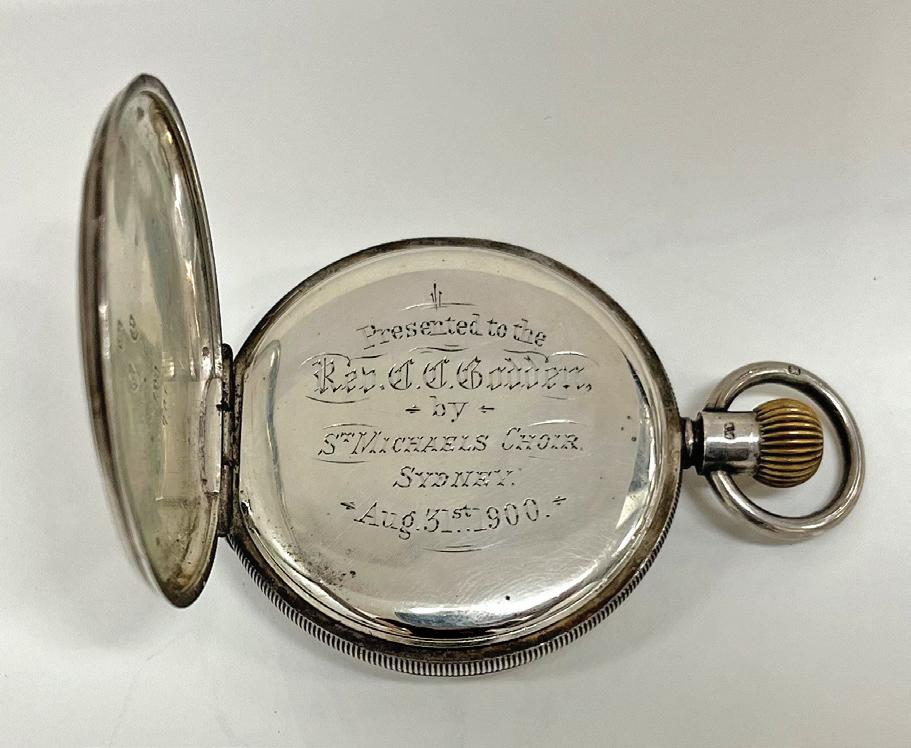
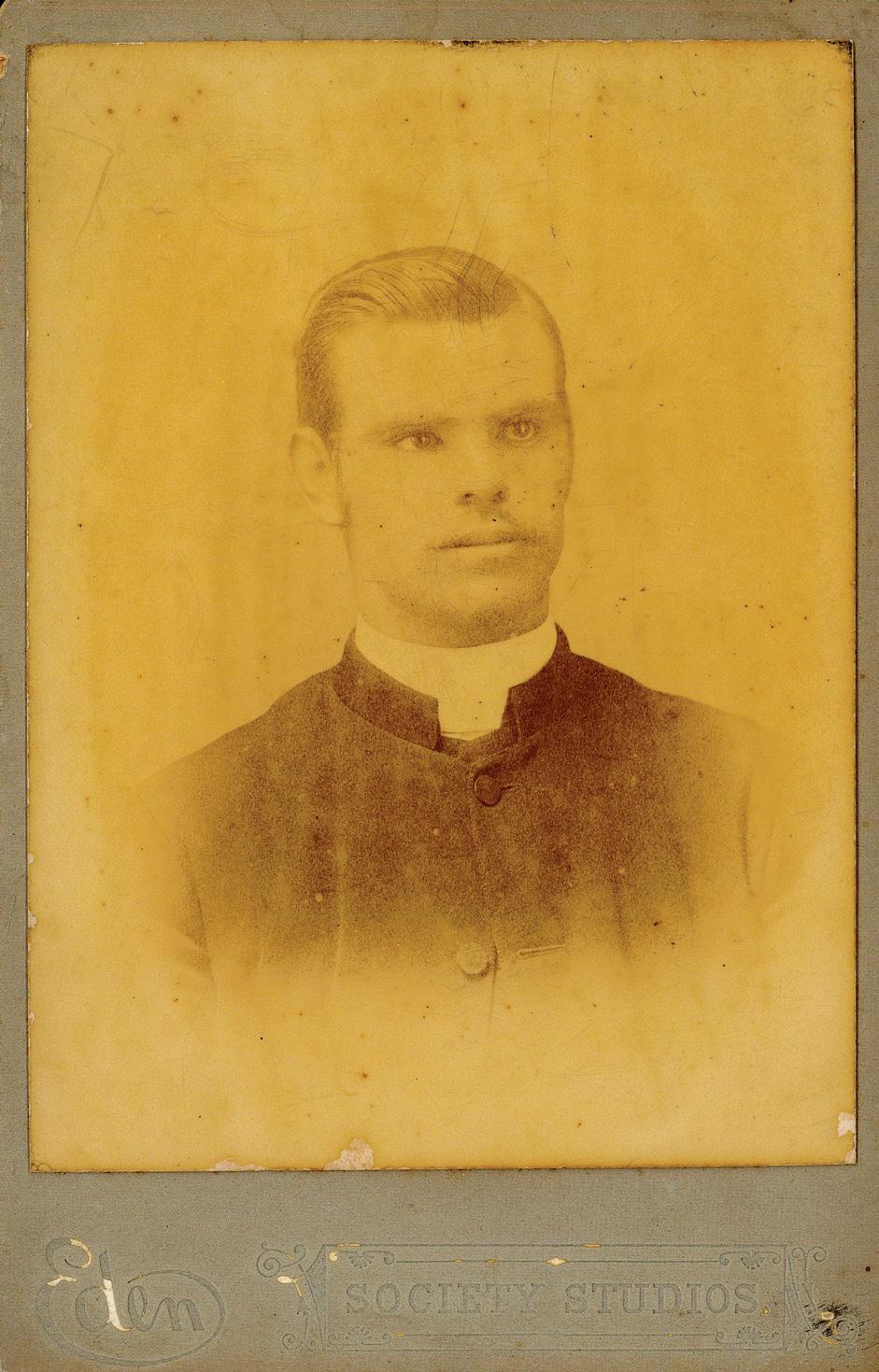


Alamemea’s brothers were ashamed of the crime he had committed and helped hand him over to the authorities so that he could be taken to Fiji for trial. They also gave Chief Roroi a pig for slaughter during the traditional reconciliation service that took place shortly afterwards. When Chief Roroi died, the local people buried their weapons in his grave.8
In tribute, Principal Jones wrote of Godden, “he was…unselfish and thoughtful. I…always felt he could be depended upon for tasks other men would be unwilling to undertake.”9 His death and his pleas for peace were used by God in the spread of the gospel among the local people, who continued to honour Charles’ memory. On the 50th anniversary of his death, a memorial plaque was unveiled in Moore College’s Cash Chapel as
7 Harris, ‘Forgotten and remembered,’ 70.
8 Harris, ‘Forgotten and remembered,’ 71.
9 Godden, Lolowai, 246.
“a constant reminder to students of the price which has been paid for the evangelization of the world.”10 Centenary commemorations were planned for 2006 but disrupted by volcanic activity, and took place in 2007, with Archbishop of Sydney Peter Jensen in attendance. He was presented with a ceremonial spear as a mark of sorrow and respect. Godden’s initial work on translating the New Testament into Havai was continued by Bible Society Australia and Bible Society of the South Pacific, and published in 2013 in Godden’s memory. The Psalms tell us that the death of God’s faithful servants is precious in His sight (Ps 116:15), and the life and sacrificial death of Charles Godden has resulted in a legacy of faithfulness to God among the people of Ambae.
10 Sydney Diocesan Magazine (Oct-Nov 1956), 37.
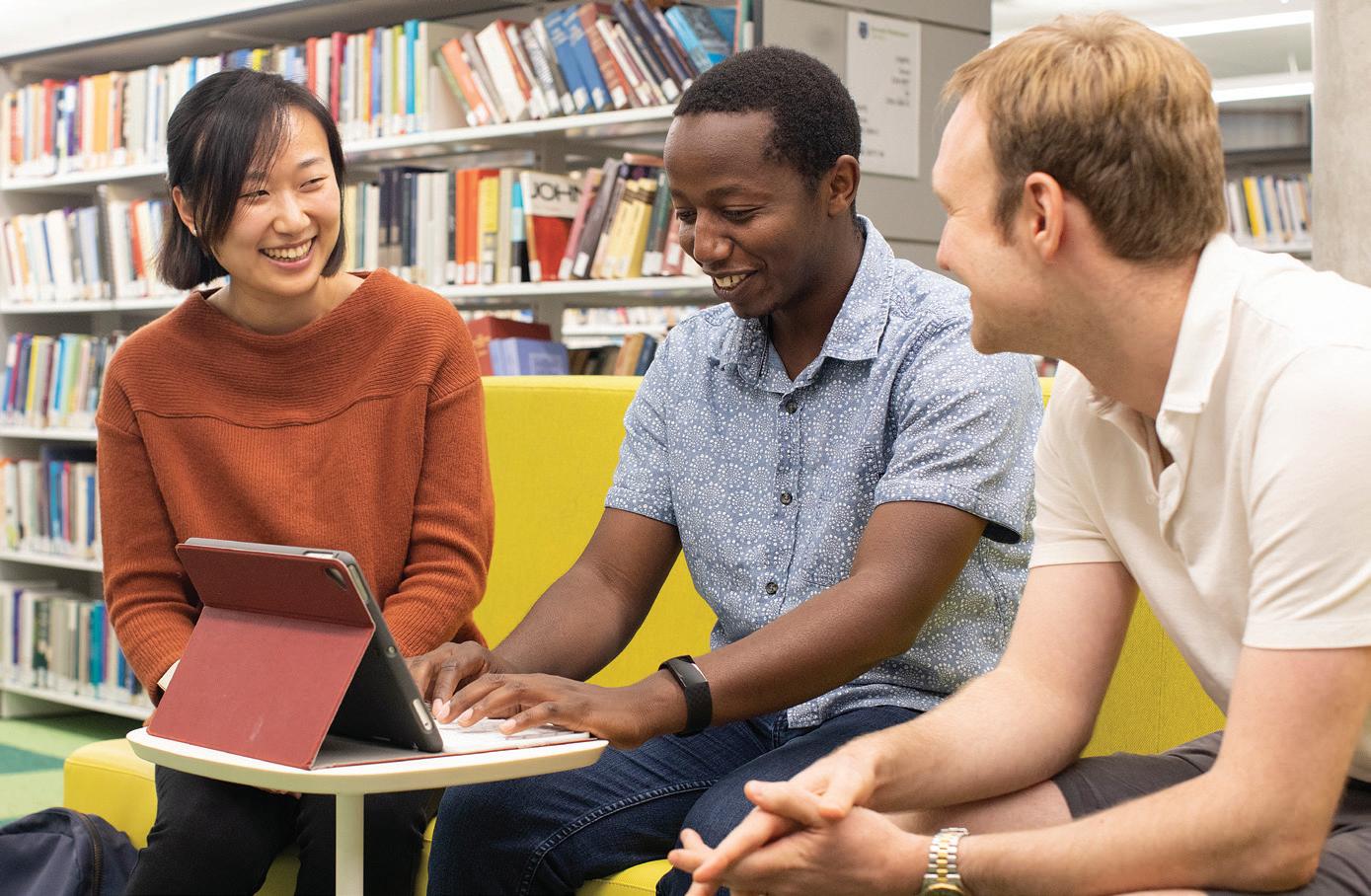
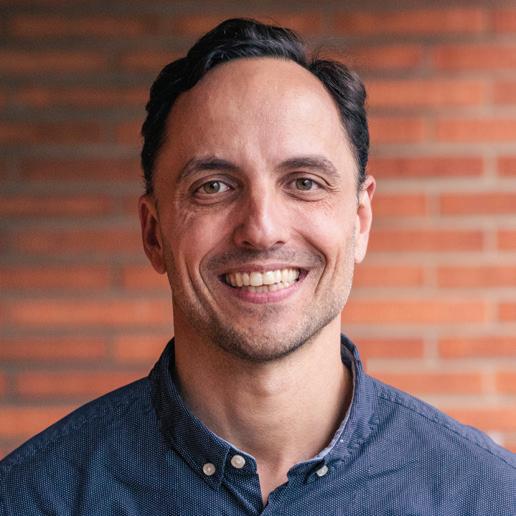 Akos Balogh / External Engagement Manager
Akos Balogh / External Engagement Manager
MANY PARTS OF THE GLOBAL CHURCH ARE IN THE GRIP OF A ‘THEOLOGICAL FAMINE’.
False teaching is rife. There are not enough Bibles or Christian resources to equip the saints. And sadly, there is a shortage of welltrained, well-equipped leaders.
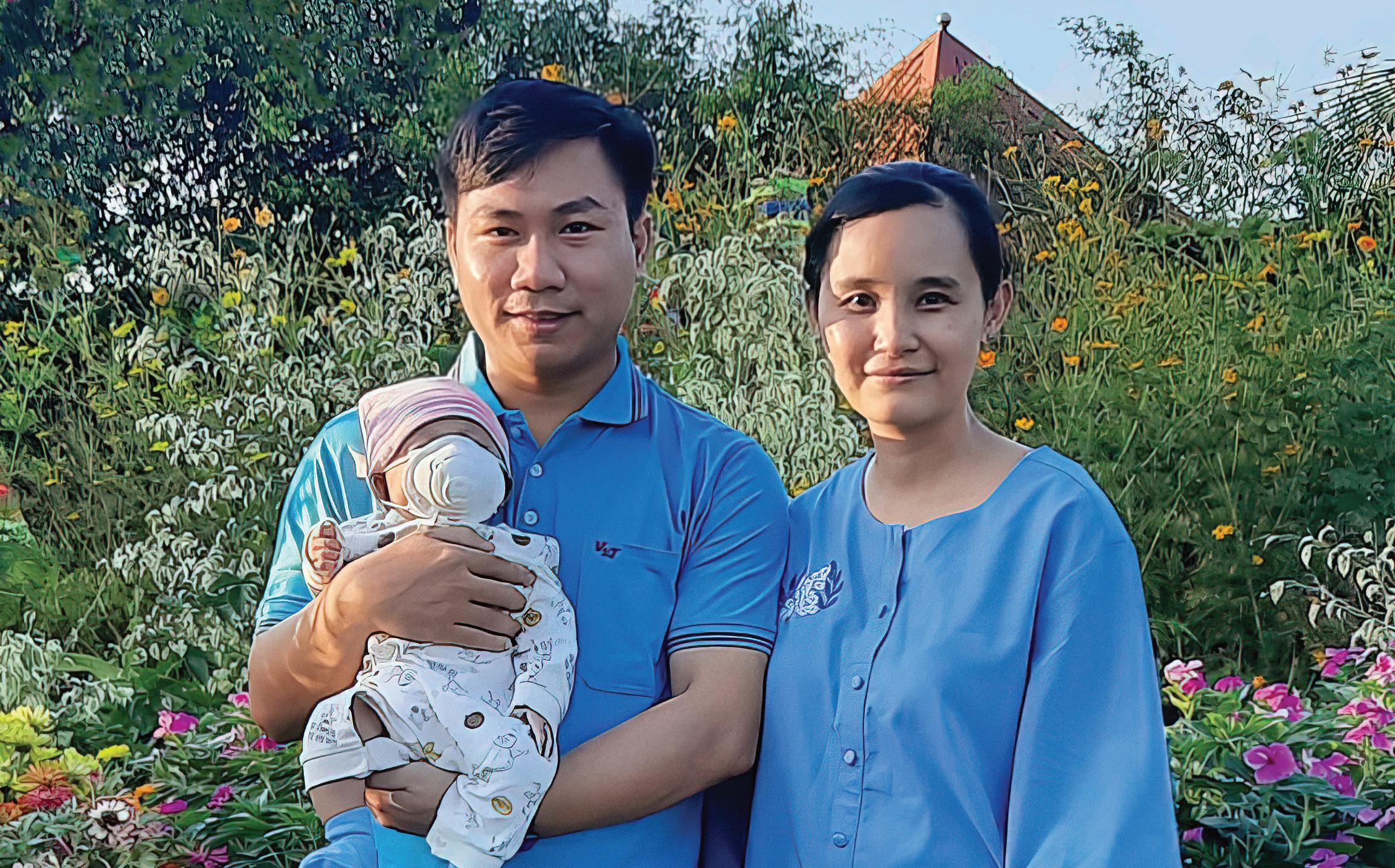
Moore College helps provide ‘theological famine relief’ for the global church in various ways. Some of our graduates are sent out as missionaries to teach and to lead. Our Centre for Global Mission translates theological resources such as the Moore PTC. And Moore College trains international students here on-site.
Many of our international students come here from countries where churches don’t always teach the Bible well, or where they face pressure for their faith.
Christians in these countries may wonder if it’s worth sticking with Jesus, or have a distorted view of the gospel. Such Christians need well-taught shepherds who can teach and lead them in the ways of our Lord (1 Peter 5:1-5). And Moore College welcomes such leaders to train and prepare them for ministry with their people.
Every international student who comes to us
gets the same training as our local students: worldclass face-to-face and full-time Reformed theological education. This education prepares them for a lifetime of ministry, no matter where they’re heading.
But studying here isn’t cheap for overseas students.
International students don’t receive financial assistance from the Australian Government. They don’t receive any Fee-Help or Austudy. They must pay for fees and living expenses out of their own pockets.
And so, many don’t come. Many have no choice but to train in their own theological and Bible
colleges, many of which are patchy regarding gospel faithfulness. But with compromised gospel training comes compromised gospel ministry. Sadly, poor training harms the growth of the gospel across the world.
But if we can help train the next generation of international ministry leaders (especially for the Majority World), this will help the gospel grow and bring more people into the Kingdom.
And so Moore College has instituted the International Student Fund, which supports international students while they study with us.
This fund helps international students complete their studies and return to lead ministries in their home countries.
I spoke with one such international student, Khanh Nguyen, from Vietnam, who has just finished his first year at College. Vietnam is officially communist, and Khanh told me the church is under pressure from regular government surveillance and government control. He couldn’t attend a theological college in Vietnam, but thankfully, the door opened for him to come to study at Moore College to prepare him for a lifetime of ministry.
Khanh says the International Student Fund has helped him to study at Moore through its financial support. Without it, he could not continue his studies. And as the borders remain open, many more international students like Khanh will train with us.

Will you give to the International Student Fund to help Moore College train the next generation of International Church and Ministry leaders like Khanh?
If the next generation of international leaders is poorly trained, this will harm the growth of the gospel worldwide. But if this generation of international leaders is well-trained, the gospel will advance under God. And Moore College is helping provide that much-needed training!

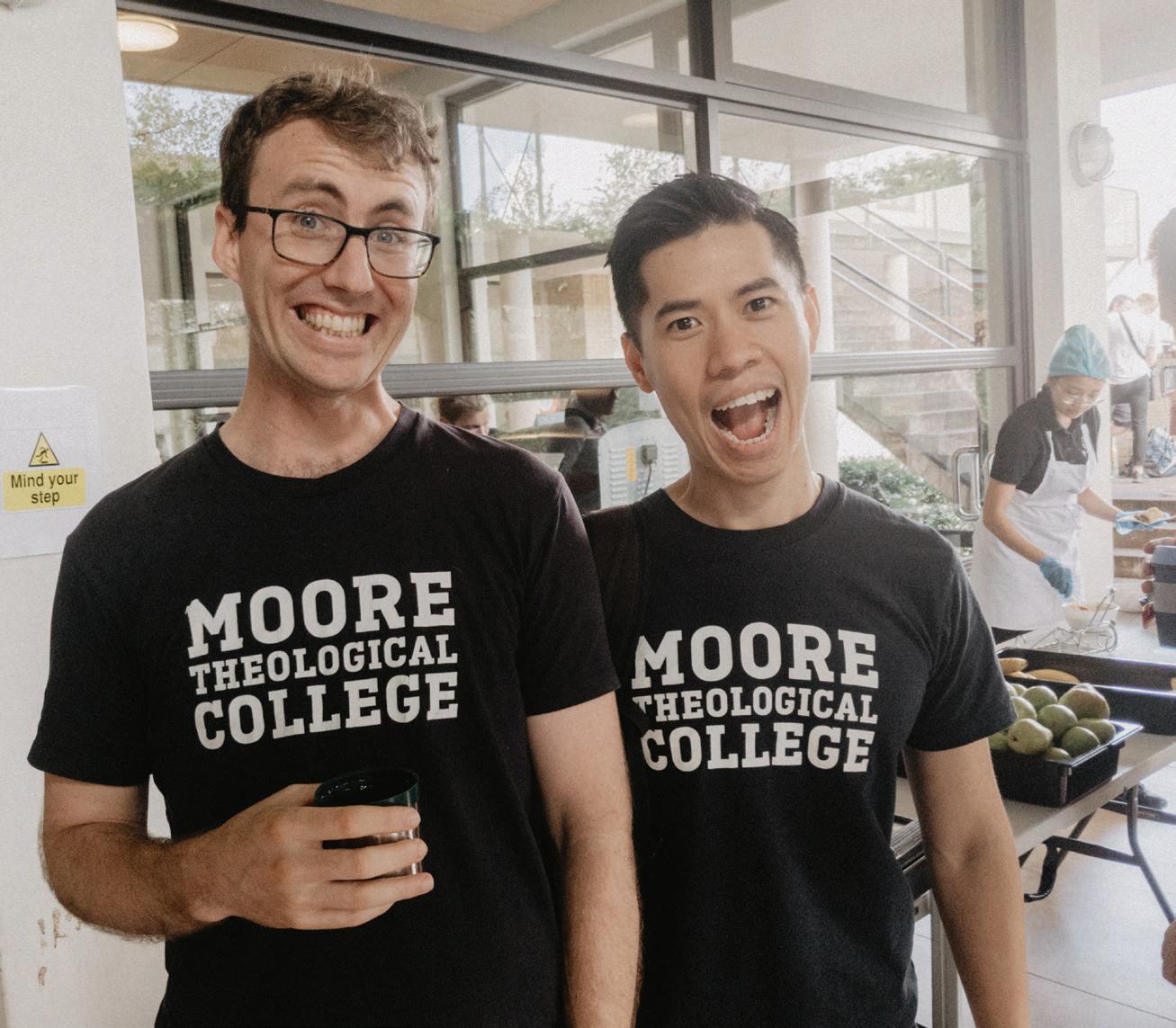
Please give to the International Student Fund, so Moore College can help train the next generation of International Ministry Leaders, and provide theological famine relief to the global Church.
To give to the International Student Fund, please visit moore.edu.au/donate, or scan the QR Code below:
Moore Matters is the newsletter publication of Moore Theological College
Principal of Moore College » The Rev Dr Mark Thompson Editor » Akos Balogh
Photography » Anna Zhu, Moore College students Art and Design » Lankshear Design
Moore Matters
Copyright © Moore Theological College 2022 1 King Street, Newtown NSW 2042 AUSTRALIA moore.edu.au | foundation@moore.edu.au +61 2 9577 9999
CRICOS #00682B | ABN 47 746 452 183
Moore College exists to train men and women to take the good news of Jesus Christ to the world. Since 1856, more than 5,000 students have graduated from the College and have been sent out by God. Moore College has equipped men and women to serve in over 50 countries across the World. Today over 3,500 students are enrolled in our courses globally.
Cover image: Kellie with students at IBC (International Bible Cafe), international student gathering
